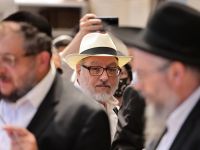Russian Foreign Minister Sergei Lavrov said on Monday that his country was ready to exchange ambassadors with Ukraine.
"The Ukrainian side recalled the ambassador, threatened to break off diplomatic relations. Now, someone mentioned the possibility of [Ukranian President Volodymyr] Zelensky's decision to return the ambassadors. We will be fine with it," the minister told Russian daily Rossiyskya Gazeta in an interview.
Despite tensions, he said, the two countries were strongly tied together.
"Our countries, even in the current conditions are strongly interconnected in the economy, transport, humanitarian affairs, family ties. And, of course, it is unreasonable to constantly erect some barriers, now for air travels, now for railway transport and simply for communications," he said.
Turning to Russia-NATO relations, Lavrov said Moscow was concerned about the planned military drill, Defender Europe 2020, the largest deployment of U.S.-based forces to Europe for an exercise in more than 25 years.
Lavrov doubted the NATO claim that the drill was not against Russia.
"In terms of military expenditure, equipment -- tanks, combat aircraft, attack helicopters, IFVs [infantry fighting vehicles], armored vehicles, warships, submarines -- only the European members of NATO, without taking into account American figures, outnumber our armed forces by more than twice," the minister said.
"Where they found a comparable opponent, I don't know. For sure, Russia is not the dominant military force in Europe. It is NATO."
Lavrov slammed the initiative of "Military Schengen" in the context of NATO's military cooperation with the EU, which implies the modernization of all transport arteries up to the eastern border of the alliance such that any major military equipment can pass freely to the east.
"Naturally, we will react. We cannot ignore the processes, which provoke a great concern. But we will react in a way that does not create unnecessary risks," Lavrov said.
While NATO continues moving eastward, he added, Washington plans to deploy intermediate-range nuclear missiles in the Asia-Pacific region, including Japan and South Korea.
"The geographical distances are such that if American intermediate-range and shorter-range missiles are placed at these points, a significant part of Russia's territory will be under attack, and in the case of Japan and Korea, our entire territory up to the Ural mountains," the Russian minister added.
This article has been adapted from its original source.








